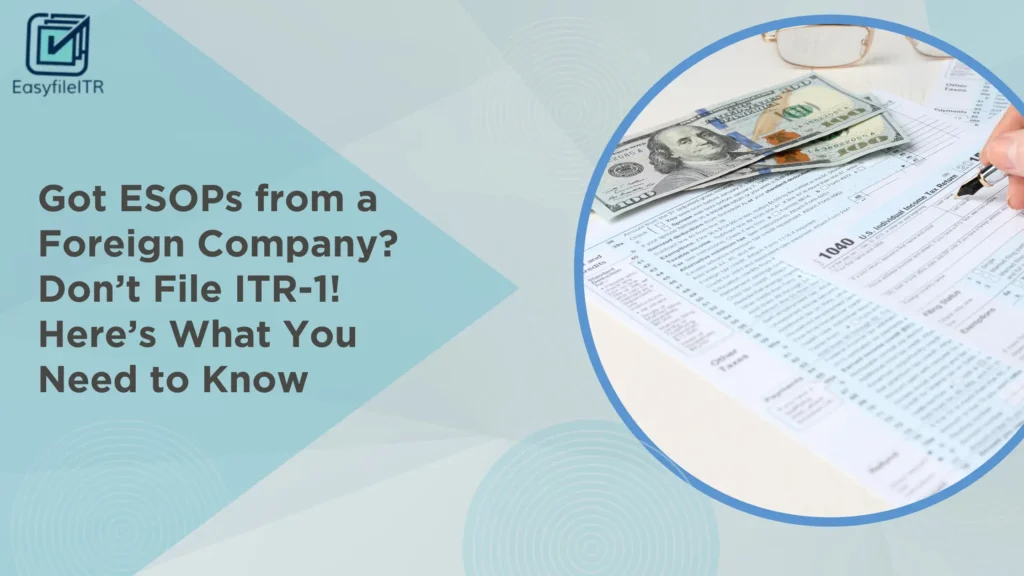
An ESOP allows employees to share in the ownership of their employer, mostly when the company is traded on foreign stock exchanges like Google, Microsoft or others. On the other hand, not all salaried experts fully grasp how taxes on ESOPs can be difficult, mainly for foreign companies. As a result, people may not submit their taxes correctly and make mistakes. When you hold ESOPs given by a foreign parent company, be sure to find out about the tax rules and select the proper ITR form.
Do not file ITR-1 as the form doesn’t apply to you
If you’ve been issued ESOPs by a foreign-listed company, you still need to use a different ITR form to file your returns. This needs to be noticed, because filing ITR-1 may result in penalties from the tax department. Strong reporting and penalty rules for foreign assets in Budget 2025 prove it is important to get ESOP tax filings right.
What Defines a Foreign ESOP?
Foreign ESOPs involve options for Indian subsidiaries working for foreign-listed groups to buy shares. When these options are exercised in India, the value is treated as perquisites by the tax authorities. Proper taxation of ESOPs requires two different stages.
- This means the difference between what you purchase with the option and the price you paid for it is considered perquisite income and should be taxed as per Section 192.
- Capital gains tax is determined by the length of the time you held the stock before selling. How the gains are taxed depends on whether you held the asset for a short or long period. LTCG will only be subject to a lower tax rate if you keep the shares for more than a year.
Submitting the Right ITR Form
Filing ITR-1 is not available if you’re given ESOPs outside India. For that reason, ITR-2 or ITR-3 must be used, depending on how you earn your income.
- When you earn salary and pension income, including from foreign ESOPs, but your income is not from your own business, you should use ITR-2.
- ITR-3 is for people with business or professional income as well as a salary.
Regardless of just having a salary and ESOP, ITR-2 should be used. Failing to check the rules may cause your return to be seen as incorrect which could result in penalties or increased review by tax officials.
Why Schedule FA Matters When Reporting Foreign ESOPs
When your ESOPs are from abroad, you need to accurately report them in Schedule FA (Foreign Assets).When filling out the ITR, remember that Schedule FA needs you to include your foreign shares, securities and cash investments in overseas companies. Failing to report foreign shares on Schedule FA can result in big fines.
- Tax evaders could be fined up to ₹10 lakhs for each year they don’t declare.
For this reason, it is necessary to provide precise and prompt disclosures in foreign ESOPs.
Tips for Making Sure Your Tax Filing Is Right
Applying the following tips will help your ESOPs be reported properly and save you from common mistakes:
- Needs to be handled by HR: It is important to confirm through HR that the TDS deduction is correct on the amount that you pay to exercise. This information will also be shown on your Form 26AS.
- Confirm: Your Form 26AS will include the TDS amount taken out from your ESOPs. If you see that something is missing, contact your HR right away to get it sorted out quickly.
- Keep records of your trades by applying the FIFO method, putting trades on the record by the order they took place. You will be able to know the total cost and profit when selling the shares for sale using accurate calculations.
Since the tax rules for foreign ESOPs are challenging, it’s wise to ask a tax specialist if you’re not confident about any reporting or filing task. They can lead you as you go and prevent any slip-ups.
What Happens if a Business Does Not Follow Health Care Rules
Failing to report and file foreign ESOPs correctly may result in extra difficulties. If you do not follow the rules, you may receive penalties and interest charges and the tax office may think your return is either incomplete or incorrect. Failing to report your foreign shares could result in a large penalty, as explained before.
In addition, reporting on foreign assets is essential under India’s foreign exchange laws. By introducing these rules, the government wishes to keep the process clear and check what Swiss accounts hold. Following the law helps keep you out of trouble with tax officials who could initiate more reviews if there are problems.
Ultimately, Being Proactive About Your ESOP Reporting Is Very Important
There is great value in foreign ESOPs, but they require you to meet certain tax obligations. Staff who get these stock options should complete the right ITR type (form ITR-2 or ITR-3), state their foreign shares correctly on Schedule FA and confirm their TDS has been correct. If you don’t obey these laws, the penalties can be very serious, so it pays to keep up with the regulations.
Don’t let your global perks become messy taxes at home; consult a tax professional for guidance about filing your ESOP disclosures correctly. Consequently, your taxes will be right, according to the law and you won’t get charged penalties.
Foreign ESOPs & ITR Filing: Frequently Asked Questions
Can I file ITR-1 if I have received ESOPs from a foreign company?
No. ITR-1 is only for simple income sources. If you have foreign ESOPs, you must use ITR-2 or ITR-3, depending on your income type.
Which ITR form should I use if I have foreign ESOPs or RSUs?
Use ITR-2 if you have capital gains or foreign assets. If you have income from business or profession, then go for ITR-3.
Do I need to pay tax in India for ESOPs received from a foreign employer?
Yes. If you are a resident in India, you must pay tax on global income, including ESOPs from foreign companies.
What if I have already paid tax on ESOPs in the foreign country?
You can claim Foreign Tax Credit (FTC) to avoid double taxation, but proper documentation is required.

